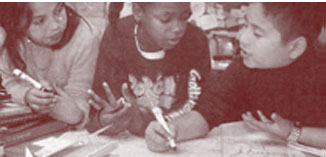


 Student
Student
Centered
Thinking
1. Student Centered Learning
2. Student Fluency
3. Communicating Learning
McKinley School is a community where all are welcome. We develop a climate of empathy, respect and creativity. We value intellectual, emotional, social and physical safety for all. We pledge the courage to hold ourselves and each other to our highest academic and social expectations. We will prove that teachers have changed their instructional methodology after being trained in Thinking Maps resulting in significant improvement in quantitative as well as qualitative data. In addition, the data will confirm that the academic instructional level has risen from primarily knowledge based learning to higher order thinking skills such as application and synthesis.
Read more about
Student Centered Thinking
 Facilitiative Leadership
Facilitiative Leadership
4. School Leadership Team
5. Implementation Plan
6. Learning Centered Leadership
My intent as the instructional leader of Roosevelt Elementary School [Stefanie R. Holzman, Ed.D.] in Long Beach, California, was initially isolated on these tools for a direct and immediate impact on student performance. What I didn't realize and could not foresee were the deeper effects upon the development of teachers across our year-round, multitrack school as a result of the use of Thinking Maps in their classrooms.
Read more about
Facilitative Leadership
 Integrated Professional Learning
Integrated Professional Learning
7. Professional Development
8. Differentiation for Educators
9. Collaborative Inquiry
Thinking Maps® were introduced in September 2007 to all staff as a key strategy which will underpin the development of thinking at St Robert of Newminster Catholic School and Sixth Form College. The purpose of this strategy was to decrease the quantity of teacher instruction and transmission of knowledge in a content driven curriculum whilst increasing the amount of time dedicated to developing learning dispositions and thinking skills through student deployment of Thinking Maps® in their learning.
Read more about Integrated Professional Learning
 Interactive Assessment
Interactive Assessment
10. Assessment to Inform
11. Reflective Thinking
12. Interactive Assessment
McKinley School is a community where all are welcome. We develop a climate of empathy, respect and creativity. We value intellectual, emotional, social and physical safety for all. We pledge the courage to hold ourselves and each other to our highest academic and social expectations.We will prove that teachers have changed their instructional methodology after being trained in Thinking Maps resulting in significant improvement in quantitative as well as qualitative data. In addition, the data will confirm that the academic instructional level has risen from primarily knowledge based learning to higher order thinking skills such as application and synthesis.
Read more about
Interactive Assessment
 School-Wide Ethos
School-Wide Ethos
13. Whole School Culture
14. Collaborative Community
15. Global Networking
The Pass Christian Public Schools received a grant from Thinking Foundation to document their incredible story. The story of 'The Pass' captured on film traces the efforts of the educators and community there to improve the achievement levels of their students through a focus on thinking, something they accomplished by becoming the top performing school district in the state of Mississippi and continue to sustain today at the highest level long after the devastating impact of Hurricane Katrina.
Read more about
School-Wide Ethos
TF Composite Case Study: Thinking Schools
This composite case study provides examples and insight into successful Thinking Schools with the five key areas for reflection. The following guiding questions provide guidance with the process:
- How would you summarize your progress in this aspect of your journey toward developing as a Thinking School?
- What documentation (interviews, artifacts) would you include to show evidence (video, documents, photos) of yours chool's development?
- What have you learned about your school in this aspect of developing as a Thinking School?
- In what specific ways do you envision your school further developing?
Each of the five key areas for reflection includes three specific criteria.
-
Five Key Areas for Reflection
- Student Centered Thinking
- Facilitative Leadership
- Integrated Professional Learning
- Interactive Assessment
- School-Wide Ethos
Additional Resources
- Report
- Video
- Still Photos
- Documents
- Composite Example Home Page
- Return to Accreditation
Home Page
Thinking Schools Accreditation: Case Study Composite
Five Key Areas for Reflection